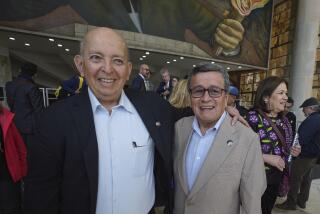Angola Government, UNITA Movement Agree to Cease-Fire
NAMIBE, Angola — The Angolan government and the UNITA movement agreed Thursday to honor 1991 peace accords and implement a cease-fire across the country to avert renewed civil war that has threatened since a dispute over elections.
High-level officials from the two sides, meeting for the first time since fierce fighting killed thousands nearly a month ago, also agreed after a one-day meeting in this southern city to ask U.N. peace monitors to remain past their Nov. 30 deadline and intensify their role.
U.N. and international observers attended the meeting.
A joint communique by the two sides said they agreed “to fully accept the Angolan peace accord as the only solution to the Angolan problem and to reiterate and effectively apply the cease-fire in the entire country and immediately cease all offensive movements.”
Civil war broke out as Angola attained independence from Portugal in 1975. An estimated 350,000 lost their lives as the struggle became a Cold War battleground. The 1991 peace accords paved the way for elections last September.
Jonas Savimbi, leader of UNITA, the National Union for the Total Independence of Angola, rejected the results of the Sept. 29-30 voting, Angola’s first multi-party general election, in which the ruling MPLA party won a comfortable majority.
Savimbi charged that the election results were rigged. U.N. observers called the voting mainly free and fair. Since then, UNITA has occupied much of Angola.
The ruling MPLA, or Popular Movement for the Liberation of Angola, won 129 of the new Parliament’s 220 seats.
President Jose Eduardo dos Santos won the presidential election but narrowly failed to gain the absolute majority he needed to avoid a runoff with Savimbi.
Savimbi said last week that he would accept the legislative results--although he still considered them rigged--and face a second presidential election round.
Earlier in Luanda, the new Parliament convened, but one-third of its deputies representing UNITA failed to appear. The MPLA and other smaller parties went ahead without UNITA.
Fernando Van Dunem, prime minister in the outgoing MPLA government, was elected president of the Parliament.
More to Read
Sign up for Essential California
The most important California stories and recommendations in your inbox every morning.
You may occasionally receive promotional content from the Los Angeles Times.










